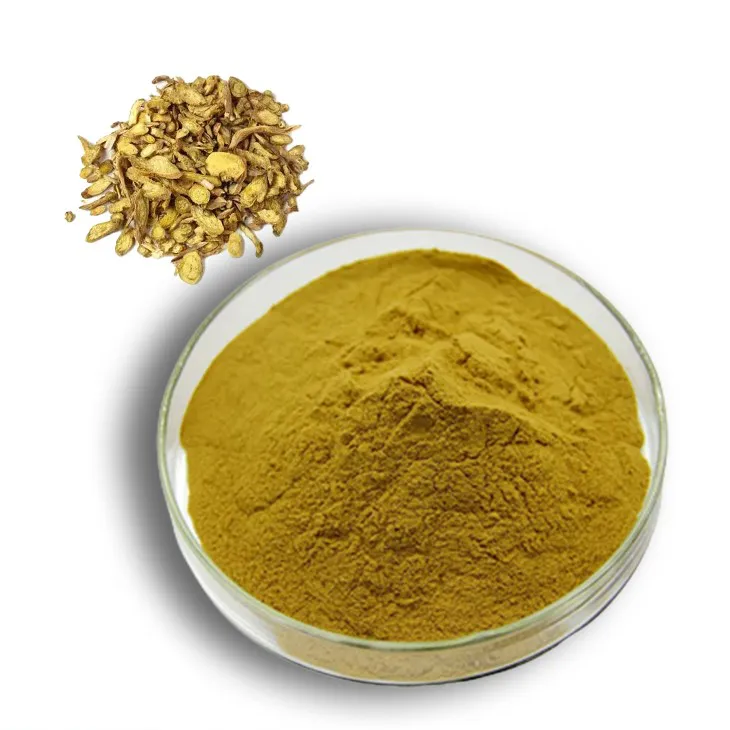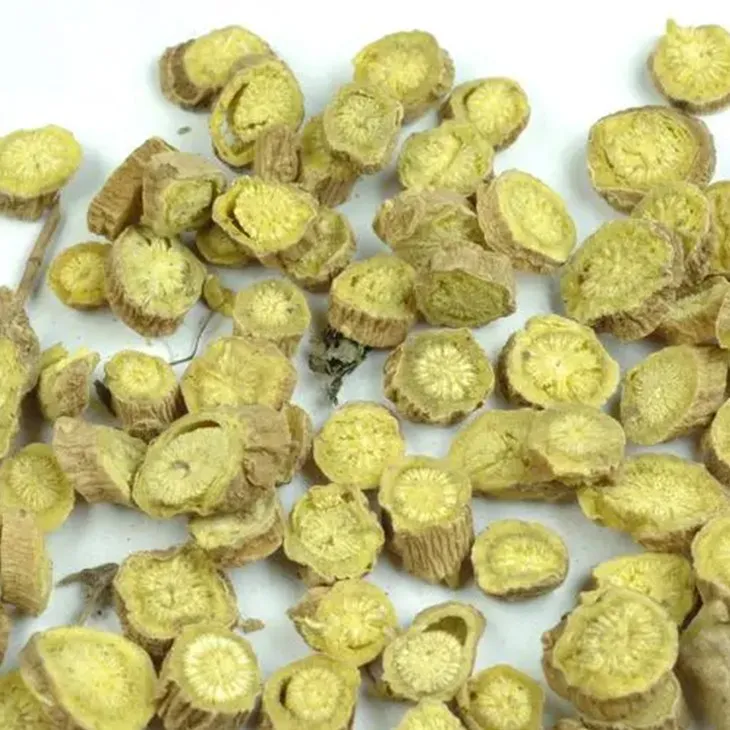- 0086-571-85302990
- sales@greenskybio.com
Is baicalin beneficial for diabetes? Are these all safe and applicable for diabetic patients?
2024-11-12

1. Introduction
Diabetes has emerged as a major global health concern, with a continuously increasing prevalence. The management of diabetes often involves a combination of lifestyle modifications, medications, and sometimes, complementary and alternative therapies. Baicalin, a natural compound, has attracted attention in the context of diabetes research. Baicalin is a flavonoid isolated from Scutellaria baicalensis, a plant with a long history of use in traditional medicine. This article aims to explore the potential benefits of Baicalin for diabetes and the safety considerations for diabetic patients.

2. Baicalin and Its Properties
Baicalin has a unique chemical structure that endows it with various biological activities. It is known for its antioxidant, anti - inflammatory, and antimicrobial properties. These properties may play a role in its potential anti - diabetic effects.
2.1 Chemical Structure
The chemical structure of baicalin consists of a flavone backbone with specific substituents. This structure is responsible for its interaction with biological molecules within the body. Understanding its chemical structure is crucial for elucidating its mechanisms of action in diabetes.

3. Potential Anti - Diabetic Mechanisms of Baicalin
3.1 Improving Insulin Sensitivity
One of the key aspects in diabetes management is improving insulin sensitivity. Baicalin may enhance insulin sensitivity through several pathways. It has been shown to modulate the activity of certain proteins involved in insulin signaling. For example, it may affect the phosphorylation state of insulin receptor substrate (IRS) proteins, which are crucial for transmitting the insulin signal within cells. By promoting the proper functioning of these proteins, baicalin can potentially improve the body's response to insulin, allowing cells to more effectively take up glucose from the bloodstream.
3.2 Reducing Blood Glucose Levels
Baicalin may also directly influence blood glucose levels. It could interfere with the processes involved in glucose production in the liver. In the liver, glucose is synthesized through a process called gluconeogenesis. Baicalin may inhibit key enzymes involved in this process, such as phosphoenolpyruvate carboxykinase (PEPCK) and glucose - 6 - phosphatease (G6Pase). By suppressing these enzymes, the production of glucose in the liver is reduced, leading to a decrease in blood glucose levels.
3.3 Protecting Pancreatic Beta - Cells
The pancreatic beta - cells are responsible for secreting insulin. In diabetes, these cells are often damaged or dysfunctional. Baicalin may have a protective effect on pancreatic beta - cells. It can reduce oxidative stress and inflammation in the pancreas, which are major factors contributing to beta - cell damage. By protecting beta - cells, baicalin may help maintain or even improve insulin secretion, which is essential for blood glucose control.

4. Evidence from Pre - clinical Studies
Pre - clinical studies, mainly conducted in animal models, have provided some evidence for the anti - diabetic potential of baicalin.
4.1 In Vivo Animal Models
In diabetic mice models, baicalin treatment has been shown to improve glucose tolerance. Mice treated with baicalin had lower blood glucose levels after a glucose challenge compared to untreated mice. Additionally, baicalin treatment was associated with improved insulin sensitivity, as demonstrated by enhanced insulin - mediated glucose uptake in skeletal muscle and adipose tissue.
Furthermore, in some studies, baicalin was found to protect pancreatic beta - cells in diabetic animals. Histological analysis of the pancreas showed that baicalin - treated animals had better - preserved beta - cell morphology and function compared to those not receiving baicalin.
4.2 In Vitro Cell Studies
Cell - based studies have also contributed to our understanding of baicalin's effects on diabetes - related processes. In insulin - secreting cell lines, such as MIN6 cells, baicalin treatment was found to enhance insulin secretion in response to glucose stimulation. This effect was associated with the regulation of intracellular calcium signaling, which is crucial for insulin exocytosis.
In addition, in liver cells, baicalin inhibited the expression and activity of gluconeogenic enzymes, supporting its potential role in reducing hepatic glucose production.

5. Clinical Studies and Their Limitations
Although pre - clinical studies are promising, the translation of these findings to clinical settings is still in progress. There have been some clinical studies on baicalin in relation to diabetes, but they have certain limitations.
5.1 Small Sample Sizes
Many of the clinical trials conducted so far have had relatively small sample sizes. Small sample sizes may limit the statistical power of the studies, making it difficult to draw definitive conclusions. For example, a study with only a few dozen participants may not be able to detect small but potentially important differences in blood glucose control or insulin sensitivity between the baicalin - treated group and the control group.
5.2 Short - Duration Trials
Most clinical trials on baicalin for diabetes have been of short duration. Diabetes is a chronic condition that requires long - term management. Short - term trials may not be able to fully assess the long - term efficacy and safety of baicalin. For instance, while baicalin may show some improvement in blood glucose levels over a few weeks, it is not clear whether these effects will be sustained over months or years.
5.3 Heterogeneity in Study Designs
There is significant heterogeneity in the study designs of clinical trials on baicalin for diabetes. Different studies may use different doses of baicalin, different patient populations (e.g., type 1 vs. type 2 diabetes), and different outcome measures. This makes it challenging to compare and synthesize the results across studies.
6. Safety Considerations for Diabetic Patients
While baicalin may hold potential benefits for diabetes, safety is of utmost importance, especially for diabetic patients who may already be taking other medications.
6.1 Interaction with Medications
Diabetic patients often take medications such as metformin, sulfonylureas, or insulin. Baicalin may interact with these medications. For example, it could potentially affect the metabolism or absorption of these drugs. There is a need for further research to determine whether such interactions occur and, if so, how to manage them. If baicalin were to enhance the effects of hypoglycemic medications, it could lead to an increased risk of hypoglycemia, which is a serious concern for diabetic patients.
6.2 Allergic Reactions
Some individuals may be allergic to baicalin or to the plant from which it is derived. Allergic reactions can range from mild skin rashes to more severe anaphylactic shock. Diabetic patients should be aware of the potential for allergic reactions when considering baicalin as a supplement. It is important to note that the prevalence of allergic reactions to baicalin is not well - established, but any allergic reaction can have a significant impact on the overall health of diabetic patients.
6.3 Effects on Other Organs
Baicalin may have effects on other organs that could be relevant for diabetic patients. For example, it may affect liver or kidney function. Since diabetes can already have an impact on these organs, any additional stress on them from baicalin needs to be carefully evaluated. Long - term use of baicalin may potentially lead to changes in liver enzyme levels or kidney filtration rates, although more research is needed to confirm these effects.
7. Conclusion
Baicalin shows potential as an anti - diabetic agent based on its various mechanisms of action demonstrated in pre - clinical studies. However, the translation of these findings to clinical practice is hampered by the limitations of current clinical studies. Moreover, safety considerations, especially in relation to diabetic patients already on other medications, need to be thoroughly investigated. Future research should focus on conducting larger, long - term clinical trials with more standardized study designs to better assess the efficacy and safety of baicalin in diabetes management. Until more conclusive evidence is available, diabetic patients should exercise caution when considering baicalin as a complementary therapy for diabetes.
FAQ:
1. How does baicalin improve insulin sensitivity?
Baicalin may improve insulin sensitivity through multiple pathways. It might interact with certain cellular signaling molecules involved in insulin action. For example, it could modulate the activity of kinases or phosphatases that are crucial for insulin - mediated glucose uptake. However, the exact molecular mechanisms are still under investigation.
2. Can baicalin completely replace diabetes medications?
As of now, baicalin cannot completely replace diabetes medications. While it shows potential anti - diabetic effects, current diabetes medications have been extensively studied and proven effective in managing blood glucose levels. Baicalin may be considered as a complementary approach, but it should not be used as a sole substitute without proper medical advice.
3. Are there any side effects of baicalin in diabetic patients?
Although baicalin is generally considered to have relatively low toxicity, some potential side effects may occur. In some cases, it could cause mild gastrointestinal discomfort such as nausea or diarrhea. However, more research is needed to fully understand its side - effect profile in diabetic patients specifically.
4. How much baicalin should a diabetic patient take?
There is no established standard dosage of baicalin for diabetic patients yet. Dosage determination depends on various factors including the patient's overall health, the severity of diabetes, and potential interactions with other medications they are taking. It is crucial that any dosage decision be made under the guidance of a healthcare professional.
5. Has baicalin been clinically proven to be effective for diabetes?
While there are promising pre - clinical studies suggesting baicalin's anti - diabetic effects, clinical proof is still not complete. More large - scale, well - designed clinical trials are required to firmly establish its effectiveness in diabetes treatment.
Related literature
- The Potential of Baicalin in Diabetes Treatment: A Review of Pre - clinical and Clinical Studies"
- "Baicalin and Insulin Sensitivity: Insights from Cellular and Animal Studies"
- "Safety and Efficacy of Baicalin in Diabetic Patients: Current Research and Future Directions"
- ▶ Hesperidin
- ▶ citrus bioflavonoids
- ▶ plant extract
- ▶ lycopene
- ▶ Diosmin
- ▶ Grape seed extract
- ▶ Sea buckthorn Juice Powder
- ▶ Beetroot powder
- ▶ Hops Extract
- ▶ Artichoke Extract
- ▶ Reishi mushroom extract
- ▶ Astaxanthin
- ▶ Green Tea Extract
- ▶ Curcumin Extract
- ▶ Horse Chestnut Extract
- ▶ Other Problems
- ▶ Boswellia Serrata Extract
- ▶ Resveratrol Extract
- ▶ Marigold Extract
- ▶ Grape Leaf Extract
- ▶ blog3
- ▶ blog4
- ▶ blog5
-
Organic Tongkat Ali extract powder factory.
2024-11-12
-
How to make powder with ashwagandha extract.
2024-11-12
-
Rosehip extract manufacturers from China.
2024-11-12
-
The best cat's claw extract in nature.
2024-11-12
-
Chinese Dandelion Leaf Extract Suppliers.
2024-11-12
-
Lotus leaf extract
2024-11-12
-
Europen Bilberry Extract
2024-11-12
-
Quercetin
2024-11-12
-
Ginseng Root Extract
2024-11-12
-
Senna Leaf Extract
2024-11-12
-
Elderberry Extract
2024-11-12
-
Moringa powder
2024-11-12
-
Mulberry leaf Extract
2024-11-12
-
Apricot Powder
2024-11-12
-
Bilberry Extract
2024-11-12





















